Justice. Integrity. Results.
The O'Brien Firm

Who We Are
Experienced Personal Injury Attorneys Who Care
STATS AND AWARDS
Why Choose The O'Brien Firm?
Cases Successfully Resolved
We Handle a Wide Range of Personal Injury Cases, Including
Car & Motorcycle Accidents
Medical Malpractice
Slip & Fall Injuries
Workplace & Construction Accidents
Catastrophic Injury & Wrongful Death
Truck & Commercial Vehicle Accidents
REVIEWS
Real Clients. Real Results.
“The O’Brien Firm gave me my life back. They handled everything with professionalism and empathy.”
— Maria T., Car Accident Victim
OUR Blog
Latest News & Updates

Understanding Emotional Trauma After an Injury & Your Rights
When accidents happen, you notice physical injuries such as cuts, bruises, and broken bones. But another kind of pain can hide in the background, and that is emotional trauma.
This hidden injury can hit you hard. And it can shake your family too.
A broken leg may take months to heal. But fear, worry, and sadness can stick around for a long time.
What “emotional trauma” can look like after an accident

Emotional trauma can show up after a scary event. It can be a car crash, a bad fall, or any other accident. In these situations, your mind tries to make sense of it, and sometimes it gets stuck.
Some people can feel the change right away. While others feel fine at first, symptoms slowly appear weeks later.
You might experience:
- Constant worry and fear about safety
- Feeling sad or empty most days
- Getting angry or irritated easily
- Trouble sleeping or bad dreams
- Flashbacks that make you relive the accident
- Feeling jumpy or on edge all the time
- Avoiding places, activities, and things that remind you of what happened
They are not signs of weakness, but are average responses to a scary event. But when it starts disrupting your daily activities, you need outside assistance.
Trauma and anxiety disorders
When your body perceives danger after an accident, your alarm system will continue beeping. This can cause issues such as anxiety disorders, panic attacks, and PTSD.
When you attempt to drive again, your heart races, and loud noises hit you like an unexpected jump scare. You may also stay on high alert, check doors, monitor people, and scan your surroundings as if you are filming a big scene.
Your brain is attempting to protect you from potential harm, but it is doing so in an overreactive manner. This happens a lot after experiencing trauma. But the good news is that it can be treated. You are not broken. You need assistance in dialing the alarm down.
The ripple effects
Every single thing in your life can be affected by past trauma. You might struggle to keep your job because concentrating can get so difficult. Stress can also lead to poor bonding with family. You might even become silent and withdraw from others, even when they want to support you.
Worry and stress can also impede recovery when your body is healing from an injury. Your body can get even less recovery done when the stress hormones become overly elevated, and this can get even worse.
Getting your life back on track

Talk to a professional early
Talking to a therapist can help you sort out trauma. You learn tools for anxiety and fear. And if your symptoms feel too loud, a doctor may offer medication to take the edge off. That can make it easier to stick with therapy. Support groups can help too. You sit with people who understand the feeling, even when you can’t find the right words.
Build a simple daily routine.
You can also add light exercise if your doctor approves. You can take a short walk or do some stretching. Keep your sleep times steady, too. Your body likes a steady plan. You need to set small goals you can finish.
Why legal support matters for healing

Legal help does more than chase money. It also removes a huge stress burden when you’re already struggling. A good lawyer can handle the paperwork and phone calls so you can focus on getting better.
Compensation can also cover more than just hospital bills. Depending on your case, it might include:
- Therapy and mental health treatment
- Money lost from missed work
- Payment for emotional suffering
But be careful, though, because insurance companies often try to downplay emotional trauma. And so good record-keeping helps protect your rights.

Dealing with Insurance Companies: Why You Need a Lawyer
Getting into an accident can turn your life upside down. Medical bills will pile up. You miss work, and your car sits damaged in the garage. And then comes another challenge: dealing with insurance companies. These companies have teams of adjusters and lawyers working to pay you as little as possible.
Many people try to handle the claims on their own. They are unaware that insurance companies operate under different rules and regulations. Having a lawyer on your side levels the playing field and ensures you don’t get taken advantage of when you’re already vulnerable.
Can You Negotiate with an Insurance Company Yourself?
Yes, you can negotiate insurance settlement terms independently. For small claims with clear facts, like a fender bender with no injuries, this might work out okay. Filing paperwork and speaking with adjusters may seem simple at first.
But here’s the truth: insurance companies know you don’t have legal experience. For bigger claims involving injuries or major property damage, they’re less likely to offer fair payment without legal pressure. A good offer might not cover all your expenses, especially long-term costs that haven’t shown up yet. By the time you realize this, it may be too late.
Common Tactics Insurance Companies Use Against Claimants
Insurance companies stay profitable by paying out less money. They use several tricks to make this happen:
First, they offer lowball settlements right away and hope you’ll grab quick cash before knowing what your claim is worth.
They also create pressure by setting tight deadlines or telling you this is their “final offer” when it’s not.
Many adjusters request recorded statements that they can later use to reduce your claim.
If these tactics don’t work, they prolong the process for months. They know you need money now for bills.
Some even deny valid claims outright. They will bet that you’ll give up rather than fight back.
Insurance adjusters handle hundreds of claims and are familiar with every trick in the book. Most people deal with one or two claims in their lifetime and are unaware of the rules of the game.
The Risks of Negotiating Alone

Going up against insurance companies without assistance can pose significant risks. You might miss important details in policy language that could help your case if you don’t have legal knowledge,
Many people are unaware of how to calculate the true value of their claim. They forget about future medical needs, ongoing therapy, or lost earning potential.
Insurance claims also have strict deadlines. If you miss one, you might lose your right to compensation forever.
The process can also drain your time and energy when you should be focusing on getting better. Paperwork, phone calls, and constant back-and-forth can also add stress to your recovery.
Perhaps most dangerous is that once you sign a settlement, you can’t go back for more money. Even if your injuries get worse or new problems develop.
How a Lawyer Can Strengthen Your Case
A good lawyer changes everything about your insurance claim. They start by properly valuing your case. They also ensure that all your expenses are accounted for, including current bills, future care, lost income, and the pain you’ve suffered.
Lawyers know how to negotiate insurance settlement offers effectively because they’ve done it hundreds of times. They spot lowball offers immediately and know how to counter them.
Your attorney collects proper evidence to support your claim, such as accident reports, medical records, expert opinions, and witness statements that make your case stronger.
They also protect you from insurance company tricks. No more worrying about saying the wrong thing in recorded statements or signing away your rights accidentally.
If negotiations fail, then your lawyer can take the case to court. Insurance companies are aware of this and often offer better settlements to avoid the expense of trials.
Conclusion
Insurance companies prioritize their profits over your well-being. They have teams of professionals working against your interests every day.
Having a lawyer means you don’t face this battle alone. Your attorney works to secure a fair payment for your injuries and losses, not just what the insurance company is willing to offer.
Don’t wait until you’ve already made mistakes. Talk to a lawyer before speaking with insurance adjusters or accepting any offers.
Having expert legal help makes all the difference if your health and financial future are on the line.
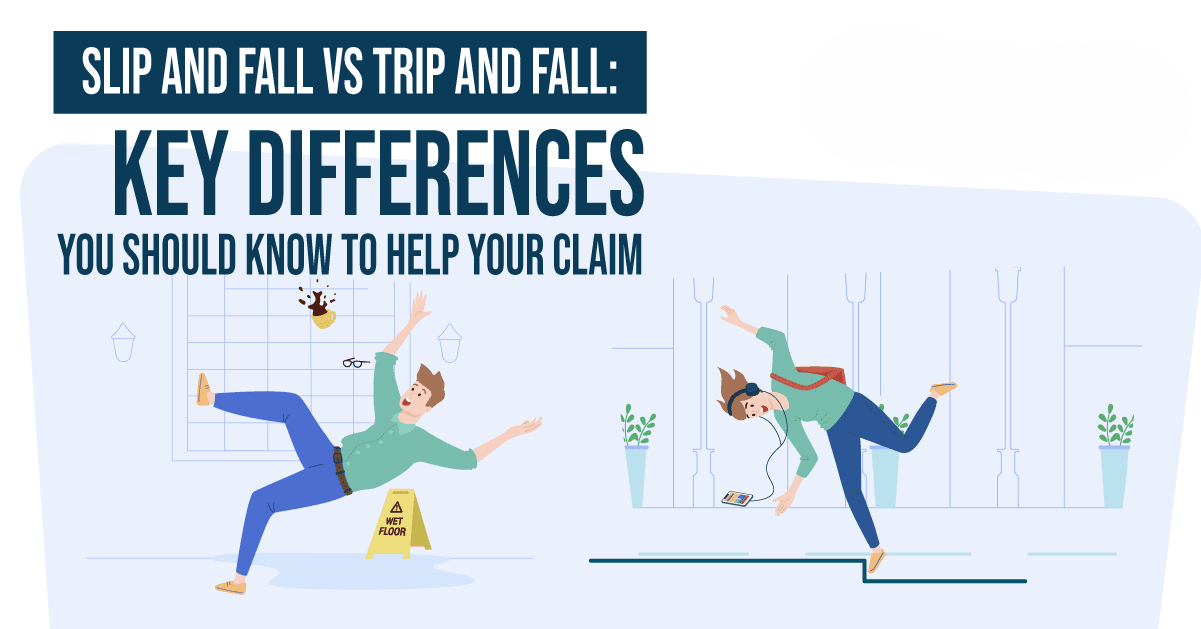
Slip & Fall vs. Trip & Fall: Why the Difference Matters in Court
Every year, you will notice that thousands of people get hurt in falls. However, most people don’t realize that slipping and tripping are two distinct phenomena. And that difference is not just about words alone, but it can also change the outcome of a court case.
If you file a claim, you will need to explain exactly what happened to maximize your compensation for your injuries. Courts and insurance companies do see slip and fall cases differently from trip and fall cases.
And so getting it right from the start can make or break your claim. Let’s examine why these two accidents are not the same.
Defining a Slip & Fall Accident
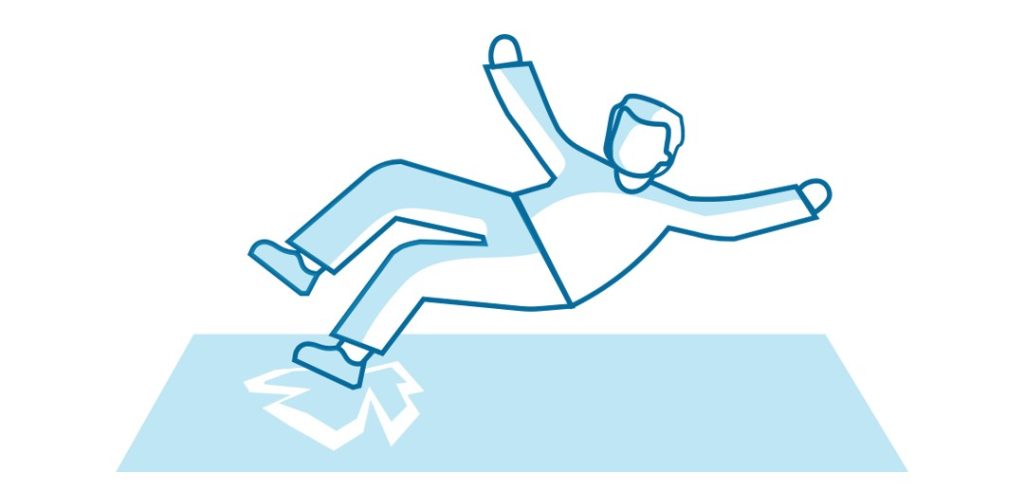
A slip and fall happens when your foot slides forward on something slick and you drop backward. One second you’re walking, the next your balance shifts behind you, and down you go.
Common causes include:
- Floors just cleaned or waxed
- Spills nobody wiped up
- Icy sidewalks without salt
- Wet bathroom floors
- Slippery carpets with poor grip
These accidents often cause injuries like sprained wrists, bruised tailbones, and head injuries. Because you fall backward, you might throw your hands out to catch yourself. That can dislocate shoulders. Many people also hit the back of their head, which in bad cases can lead to brain injuries.
Defining a Trip & Fall Accident
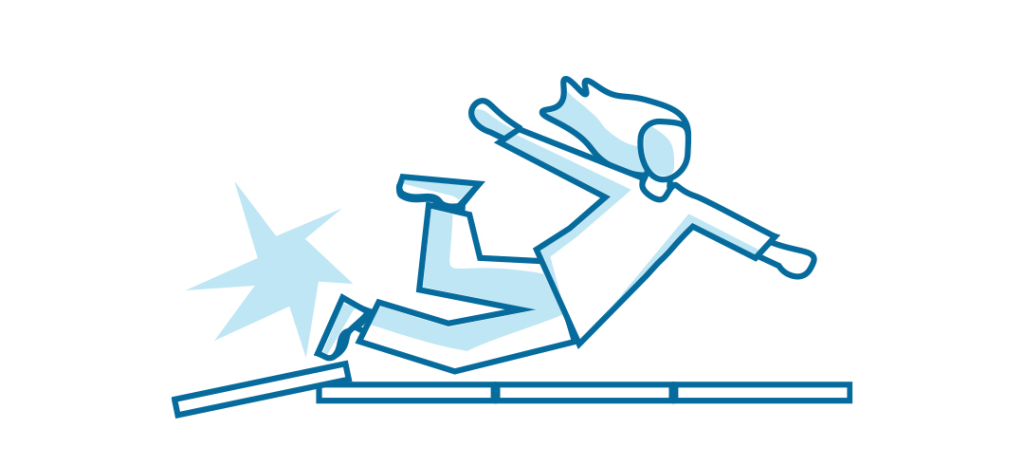
A trip and fall happens when your foot catches on something and you pitch forward. Your foot stops, but the rest of you keeps going straight to the ground.
Common causes include:
- Sidewalk sections that stick up
- Cords or objects left on the floor
- Door thresholds are raised too high
- Loose floorboards
- Steps without clear markings
Trips often result in a wide range of injuries. Many people can hurt their hands or wrists while trying to break the fall. Knee scrapes, broken fingers, and facial injuries are some of the common injuries. Some can also strain their neck when their head jerks forward.
Slip & Fall vs. Trip & Fall
Mixing up a slip and a trip in court can hurt your case. Judges and juries listen very closely to all the details. It can make them doubt your story if you initially say one thing and then change it later.
Here’s why it matters:
- Slip cases are about floor conditions and missing warning signs.
- Trip cases are about hazards or damaged surfaces that should have been fixed or marked.
And so that changes how your lawyer works. For example, if you slip, they’ll focus on cleaning records and maintenance. And if you trip, then they’ll look at how long the hazard was there and whether the owner was aware of it.
Property owners can also have different jobs for each. For slips, they will need to clean up the messes fast. For trips, they will need to repair the damage and keep the walkways clear.
Common Locations Examples
Slips and falls often happen in:
- Grocery stores after the floors are mopped
- Restaurant bathrooms with wet tiles
- Building entrances on rainy or snowy days
- Pool decks without grip-friendly surfaces
Example: A shopper slips on a freshly mopped store aisle without a warning sign.
Trips and falls often happen in:
- Public sidewalks with cracks or raised edges
- Stores with items blocking the aisles
- Homes with loose carpet edges
- Parking lots with potholes
Example: Someone trips over a box left in a store aisle or on a broken sidewalk slab.
Both accidents can happen anywhere. However, if property owners fail to take steps to prevent them, they can be held responsible.
What to Do Immediately After a Slip or Trip Accident
If you fall, act quickly to protect your health and your claim:
- Get medical care right away. Even if you feel fine, injuries can show up later.
- Tell the property owner or manager. Get a copy of any report they make.
- Take photos of what caused your fall before it’s cleaned or fixed.
- Write down the names and numbers of witnesses.
- Keep the shoes and clothes you wore.
- Track all medical visits, pain levels, and changes in your daily life.
- Avoid posting about it online, as insurance companies often check.
- Consult with a lawyer before speaking with insurance representatives.
How a Lawyer Can Strengthen Your Case
A skilled lawyer knows the exact safety rules and spots when someone breaks them. They can:
- Bring in experts to explain how it happened
- Find video or witnesses you didn’t know about
- Add up your costs, including future care
- Handle tough insurance adjusters
- Keep your story clear and matched to the proof
- Take care of all the deadlines and forms so you can heal
Sometimes, more than one party is at fault, as in the case of a store and its cleaning contractor. A lawyer can figure that out, too.
Conclusion
Knowing whether it was a slip or a trip is a significant matter. They happen for different reasons, cause different injuries, and get treated differently in court. If you’ve been hurt in one, take photos, see a doctor, and call a lawyer who understands these cases. The right help can get you the money you need for your medical bills and recovery.

Surgical Errors and Your Legal Rights
Going in for surgery is nerve-wracking enough without the thought of something going wrong. But sometimes in life mistakes do happen that never should.
Surgical errors are preventable mistakes made during an operation. They’re not the same as the normal risks that come with any procedure. You have rights if you’ve been hurt because of one such surgical error. Knowing these rights can help you protect yourself and get the support you need when things go wrong.
Surgical Errors vs. Known Surgical Risks
Every surgery carries some level of risk, even when everything is done correctly. Before your operation, your doctor should explain these possible problems – that’s called informed consent. Surgical errors are different. They’re mistakes that happen when proper care isn’t followed.
For example, small bleeding during gallbladder surgery can be a normal risk you agree to. But if the surgeon cuts a major blood vessel they should have avoided, that’s an error. The key question is whether the care matched what other skilled surgeons would have given in the same situation. This “standard of care” is what helps decide if a surgical error claim is valid.
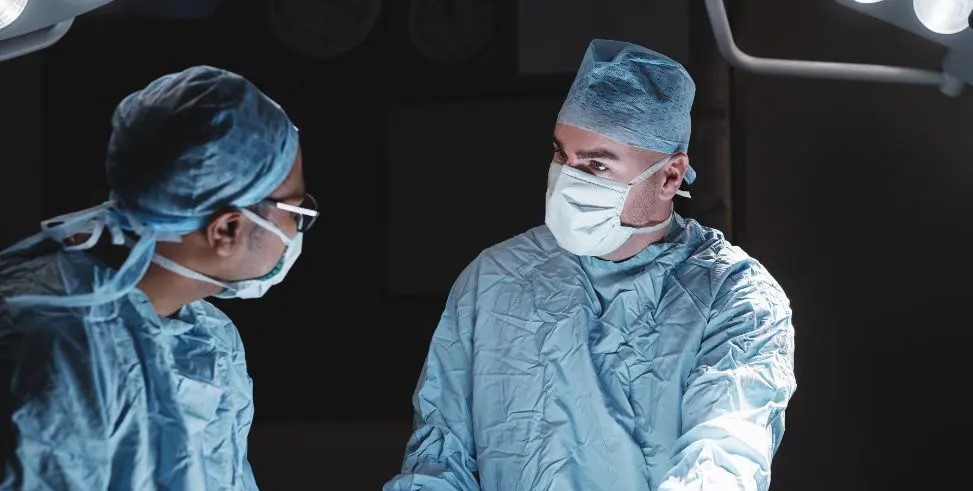
Common Types of Surgical Errors
Some mistakes happen more often than others:
- Operating on the wrong body part or even the wrong patient
- Damaging nerves during surgery, leading to pain or loss of movement
- Leaving tools or sponges inside the body before closing
- Giving the wrong medicine or the wrong dose
- Creating holes in organs or blood vessels that aren’t noticed immediately
Some errors are spotted during surgery. Others may not show up for days or weeks, only becoming clear when infection or pain develops.
Causes and Contributing Factors
A range of problems can lead to surgical errors:
- Poor communication between doctors, nurses, and other staff
- Overtired medical teams working long shifts
- Lack of proper training or experience
- Skipping important details in patient records
- Equipment problems or breakdowns
- Ignoring safety steps, like proper cleaning of instruments
When hospitals or surgical teams rush or skip checks, patients can get hurt.
Your Legal Rights After a Surgical Error
If a surgical error harmed you, then there are key rights to remember:
You have the right to understand your surgery before it happens. You should also be aware of all the risks and the options available to you.
Not only that, but you should also get a second opinion from another doctor if you suspect something is not right.
You may be owed money for the harm caused. And this can include the following:
- Costs of extra medical treatment to fix the mistake
- Pay lost from missing work
- Expenses for therapy or recovery services
- Payment for the pain and suffering you’ve gone through
These rights exist so you don’t have to bear the cost of someone else’s mistake.
Proving Surgical Malpractice
To win a case, you must show the doctor failed to give proper care. You need proof that the mistake directly caused your injury. In most cases, another medical expert must explain how the surgeon failed to meet basic standards.
Emergencies can make proving malpractice harder, since doctors may need to make fast decisions under pressure.
And that is why gathering evidence early matters so much. Your case becomes strong if you have all the records, witness statements, and expert opinions.
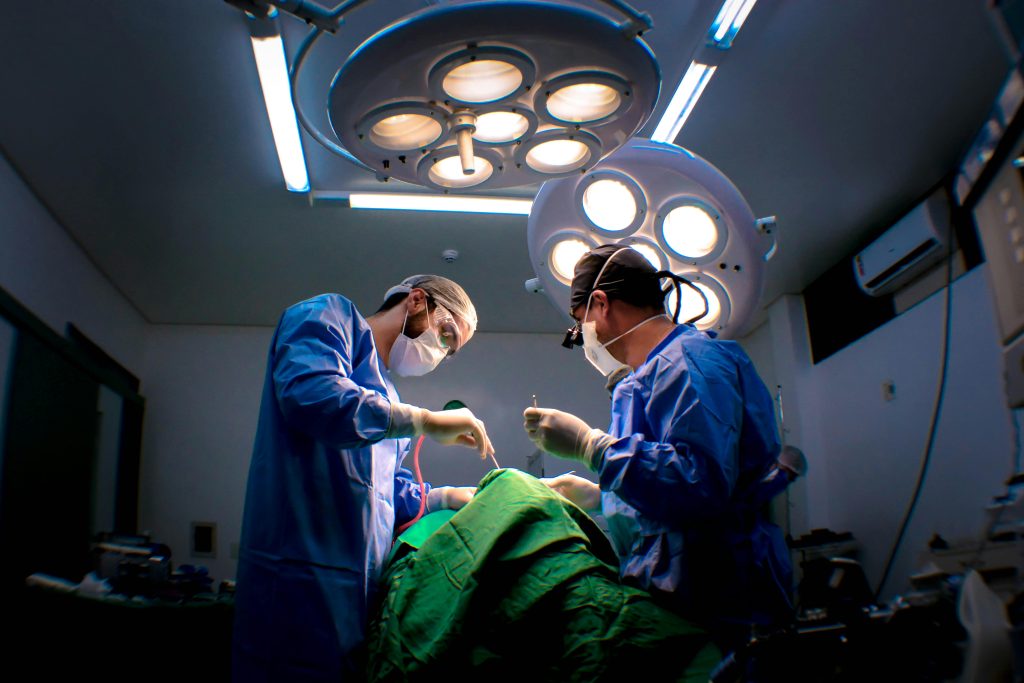
Steps to Take If You Suspect a Surgical Error
If you think a surgical error has happened:
- Keep detailed notes – your symptoms, what doctors say, and all medical reports.
- You can check with another doctor right away to check your condition.
- You can also report the problem to the hospital.
- Speak to a lawyer who knows about medical mistakes.
- Act quickly, as there are time limits for filing a claim.
Procedural Requirements for Filing a Claim
The process for filing a claim varies from state to state. Some states can require a letter from another doctor confirming that your surgeon made a mistake. At the same time, others can have review boards that look at cases before they go to court. And these rules can help make sure that only valid claims move forward.
Following your state’s steps exactly is crucial. So missing them could mean losing your chance for help.
Conclusion
Surgical errors should never happen in the first place. But if they do, then you need to have strong legal protections. The first step is to be aware of the difference between a normal risk and a preventable mistake. Take action fast to protect yourself if you have been hurt.

Injured at Work? Your Rights and What to Do Next
Know Your Rights as an Injured Worker
If you get hurt at work in the US, you have legal rights to protect your health, income and employment status. Most employees are covered by state workers’ comp laws which provide benefits regardless of who was at fault. Your core rights include filing a workers’ comp claim, getting medical treatment and wage replacement if you can’t work. Employers can’t retaliate against you for reporting an injury or filing a claim. You may also be eligible for disability benefits if your injury results in temporary or permanent impairment and you have the right to refuse unsafe work and access to workplace hazards.
Immediate Steps to Take After a Workplace Injury
First and foremost, your health and safety. Get medical attention right away, even if the injury seems minor. Medical care not only protects you but also creates important documentation for your claim. If possible, ask your supervisor to authorize treatment and provide any necessary forms before you see a doctor. In an emergency, get care right away and notify your employer as soon as possible afterwards.

Report your injury to your supervisor or manager as soon as possible—ideally within 30 days as required in most states. Delays in reporting can jeopardize your benefits. Fill out a workplace injury report and keep a copy for your records. This report should detail how, when and where the injury occurred, the nature of your injuries and any witnesses present.
Filing a Workers’ Compensation Claim
After reporting your injury and getting medical care, your next step is to file a workers’ comp claim. Your employer should give you the forms but you can also contact your state’s workers’ comp board for guidance. File your claim as soon as possible as deadlines vary by state but are usually within one year of the injury. Include all supporting documentation such as medical records and the injury report.

Workers’ comp benefits usually cover medical expenses, a portion of lost wages and if needed, vocational rehab to get you back to work. If your injury results in a disability you may be eligible for additional benefits. Some states also allow you to choose your own doctor while others require you to see an employer approved provider.
Legal Protections and Next Steps
It’s illegal for your employer to harass, threaten or retaliate against you for filing a claim or seeking medical care. If you experience any discrimination or your claim is denied you have the right to appeal and get legal representation. A workers’ comp attorney can help you through the process, protect your rights and assist with appeals if needed.
Preventing Future Injuries
After your injury your employer should investigate the incident and fix any workplace hazards to prevent future accidents. You also have the right to request safety training and information about hazardous materials or conditions in your workplace.
Knowing your rights and following these steps will get you the care, benefits and legal protections you deserve after a workplace injury. If you have any questions at all, contact a qualified workers’ comp attorney.
